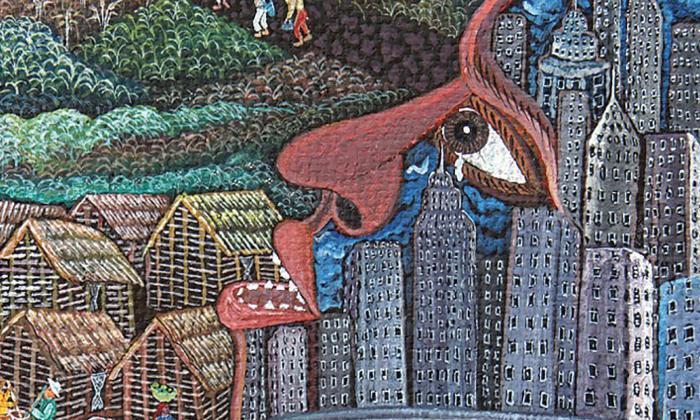
As the plane descended, Joseph could not tear his eyes away from the palm trees rapidly getting closer. He pressed his nose against the window to get a better view.
Joseph, who was adopted, was traveling to Haiti, the country of his birth.
He had wanted to visit Haiti ever since his fourth-grade teacher gave his class an assignment: Share an important landmark from your culture of origin. Joseph could still hear his classmates excitedly shouting, “I choose the Eiffel Tower!” and “I choose the Taj Mahal!”
The assignment had put Joseph’s stomach in knots. He didn’t have any ideas about what his landmark should be. He wasn’t even sure he wanted to remind his classmates that he was adopted. It made him feel different. He still remembered embarrassing questions like, “Why is your dad white?” and “Do you miss your real parents?”
But now he was here, and Joseph and his father boarded a bus called a “tap-tap,” meaning “quick quick” in Haitian Creole. They laughed as they were greeted by a bleating goat and squawking chickens that passengers were either holding in their laps, like babies, or carrying in crates.
“I am Louis. Where are you going?” asked the driver with a wide grin, shouting above the noise.
“To see the Citadelle!” Joseph’s father shouted back.
“Ah, the Citadelle Laferrière,” Louis said happily. “The unknown eighth Wonder of the World.”
“Why is it called ‘unknown’?” Joseph asked curiously.
Louis explained that Haiti has experienced many bad times—including a recent earthquake—and that it is often hard for people to see the beauty and promise that exists on the island and within the Haitian people.
“To the Haitian people,” Louis said, “the Citadelle is a symbol of the sacrifice that we were willing to make for our freedom, showing our strength and our resilience.”
Suddenly in the distance, they saw it. Joseph gasped with delight. “There it is!”
They stood at the foot of the mountain, with its steps winding high up into the sky, where the Citadelle loomed majestically above them. Its diamond-shaped front extended so far, it looked like a pirate ship that was somehow part of the surrounding mountains.
“It’s incredible,” said Joseph’s father. Joseph agreed. He had thought these kinds of magnificent buildings existed only in cities, surrounded by noise and people, with only other tall buildings for company.
The Citadelle, by contrast, stood alone in the middle of a forest of palm trees and wild flowers, surrounded by quiet, with the silence broken only by the sounds of birds chirping and the distant crashing of waves.
Louis explained that Haiti was a French colony and that the colonists had forced many thousands of enslaved people to come to the island from Africa and labor in the plantations. However, in 1791, the enslaved Haitians began the fight for their independence, defeating the French in 1804 after many heroic battles. Under King Henri Christophe, formerly enslaved Haitians built the Citadelle into the side of Haiti’s tallest mountain to defend their home against future attacks and to serve as a symbol of liberty, completing it in 1820.
Inside the Citadelle, Joseph looked up and realized there was no ceiling but, instead, a series of crisscrossed stone walkways that looked like lace. Looking through them at the sun above was like looking through a kaleidoscope and seeing many colors and shapes.
As they made the long trek back down the mountain, Joseph thought about the thousands of Haitians walking along that same path so long ago. They may have been scared, but they had succeeded against all odds to build the mightiest fortress in the Caribbean.
Joseph no longer felt afraid, but tall and strong, like the Citadelle. For the first time, Joseph felt glad to be different and special. He could not wait to tell his classmates the incredible tale of his landmark, the unknown wonder.
Questions for Readers
Right There (In the Text)
Why was the Citadelle built?
Think and Search (In the Text)
Why is it sometimes hard for non-Haitian people to see beauty and promise in Haiti?
Author and Me (In My Head)
What does Joseph think about during his trek back down the mountain?
On My Own (In My Head)
What does it mean for people to “fight for their independence”?
